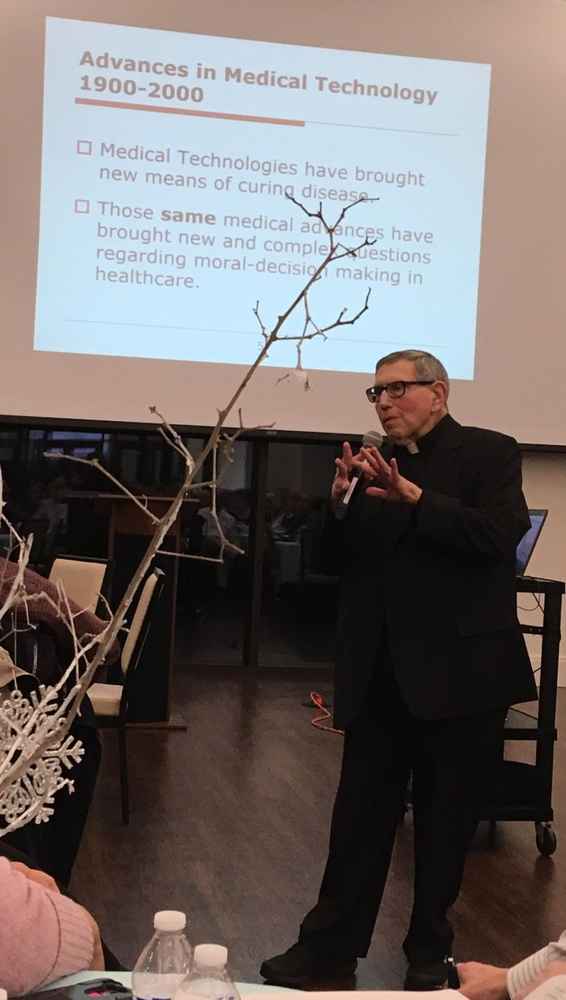Coming to Grips With End-of-Life Teachings

Recently, the Central North Carolina Region hosted the Rev. Charles Vavonese, Chaplain for the Syracuse Region, and the author of the booklet, “I am the Resurrection and the Life, A Resource of Catholic Moral Teaching on End-of-Life Issues,” for a Defense of the Faith presentation. “At a time when there are so many voices contrary to the Gospel of life, we thought it was important as knights and dames of Malta to sponsor Father Vavonese to speak to our community in defense of our faith, particularly as it relates to end-of-life issues,” said Msgr. Anthony Marcaccio, chaplain of the Central North Carolina Region.
Father Vavonese pointed out that the advances made in medical technologies that are curing diseases could be a source of anxiety, since they bring new questions and concerns about medical treatment and moral decision-making.
“In any end-of-Life discussion, it is critical that we are clear that Catholic moral theology holds that there are several non-negotiables that may not be violated,” Father Vavonese said. “They are: life is a gift from God and therefore every life is sacred; we are stewards of our lives and not the owners; we are responsible for the ordinary care of our bodies and have a reasonable hope of returning them to health; and every life deserves the respect and protection of the law.”
He went on to say that, “As Catholics, we believe in a better life to come. There may come a point in one’s illness where one must accept the human condition with profound Christian hope in the life that is to come. Death is a doorway to our ultimate destiny with God.”
Father touched on many important topics during his presentation such as: taking the middle course between vitalism, which holds that everything possible must be done to keep the heart beating, and subjectivism, which holds that life only has value as long as the individual believes that it has value; what ordinary means should be used to preserve life; what are the ethical and religious directives regarding assisted nutrition and hydration; palliative care for the terminally ill; Do-Not-Resuscitate orders; living wills; health care powers of attorney; medical orders for life-sustaining treatment; and opposition of the Catholic Church to physician-assisted suicide.
Some participants were visibly moved by the presentation, and others expressed relief to learn that decisions they had made for their relatives had been consistent with Catholic teaching.
Msgr. Marcaccio shared that, “When it comes to talking about end-of-life issues or even funeral preparations, denial is too often the operative dynamic. I learned from my father’s death that one of the most loving gifts he could give us was a clear articulation of what he wanted going forward with his medical treatment.”
Msgr. Marcaccio urged all of the participants to prepare an end-of-life document that reflects Catholic teaching, and to have a clear, real, loving conversation expressing your wishes to the person you have designated to make decisions for you when you are unable to make them for yourself. “A carefully written legal document maybe helpful in knowing one’s desired course of medical care,” he said, “but pales in comparison to having designated a compassionate individual whose conscience has been formed by our faith.
“Given the advances in healthcare and the nuances involved in each person’s particular situation, it is critical to have our folks vest the legal, life-respecting, decision-making power in a person not a document.”
Father Vavonese’s presentation was a gift to all who heard it, as it offered answers and peace to those who had been wrestling with these issues in their own lives and in the lives of their loved ones.
“From my experience, both personally and pastorally, I beg people not to put off these frank and sometimes difficult conversations,” Msgr. Marcaccio said. “I’m so grateful to Father Vavonese for his presence and presenting us with a wide range of resources to start that very discussion.”
